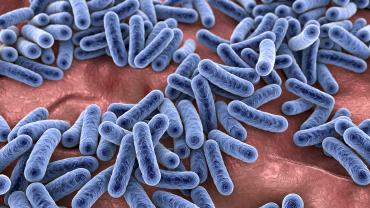
The gut microbiome plays a key role in immune function and health. The commensal microbes act to prohibit potentially pathogenic bacteria from colonizing and potentially causing an immune response. This is managed is by altering pH levels to create an unfavorable environment and generating bacteriocins. Metabolites from commensal bacteria, such as short-chain fatty acids (SCFA), also support immune function, which includes promoting a healthy inflammatory response and supporting antioxidant status. The microbiome and its metabolites also promote the production of epithelial antimicrobial peptides. The commensal bacteria help train the immune cells, priming them to be ready to act upon infection while also not becoming hypersensitive. The commensal microbes stimulate macrophages, dendric cells, and other antigen-producing cells and increase immunoglobulin A secretions. They also regulate cytokine production.
An important part of immunotolerance occurs early in life when the immune system learns to recognize commensal bacteria to support its function. Building a healthy, diverse microbiome begins in utero. Early infancy and childhood greatly influence the makeup of an individual’s microbiome for life. Colonization of the gut microbiome experiences continual evolution, especially between the ages of 3 and 6 years old, before it becomes more stable in adulthood. Method of delivery, gestational age at birth, breast or formula feeding, diet upon weaning, infections or exposure to antibiotics, social and familial interactions, household pets, and environmental exposures all influence the makeup of the gut microbiome.
Research has found that the altered gut microbiome in infants and children is associated with an increased risk of developing certain conditions associated with altered immune function. A systematic review based on data from 21 studies found that the early microbiota of children who later developed allergies had a predominance of Firmicutes, a higher count of Bacteroidacease, a higher prevalence of anaerobic bacteria including Escherichia coli and Clostridium difficile, a lower prevalence of commensal bacteria, such as Bifidobacterium bifidum and B. longum, and an overall lower microbial diversity. There was also lower bacterial diversity with the onset of allergic symptoms. Likewise, another systematic review found that reduced bacterial diversity was associated with allergenic diseases, including eczema and asthma. There was a stronger association in neonates compared to older children. The researchers concluded, this “suggests early-life microbial exposure plays a more important role.”
Dysbiosis may also increase the risk of developing autoimmune conditions. A systemic review found a significant association between alterations in gut microbiota and type 1 diabetes. A meta-analysis found an association between early infection or antibiotic use, which may lead to dysbiosis, and an increased risk of developing celiac disease later in life.
Many factors in early life influence the development of the immune system, including the colonization of the gut microbiome. Some early influences into building a healthy microbiome are easier to adjust than others, such as diet. In certain instances, probiotics may also promote microbial diversity to support immune function in childhood into adulthood.*
By Kendra Whitmire, MS, CNS